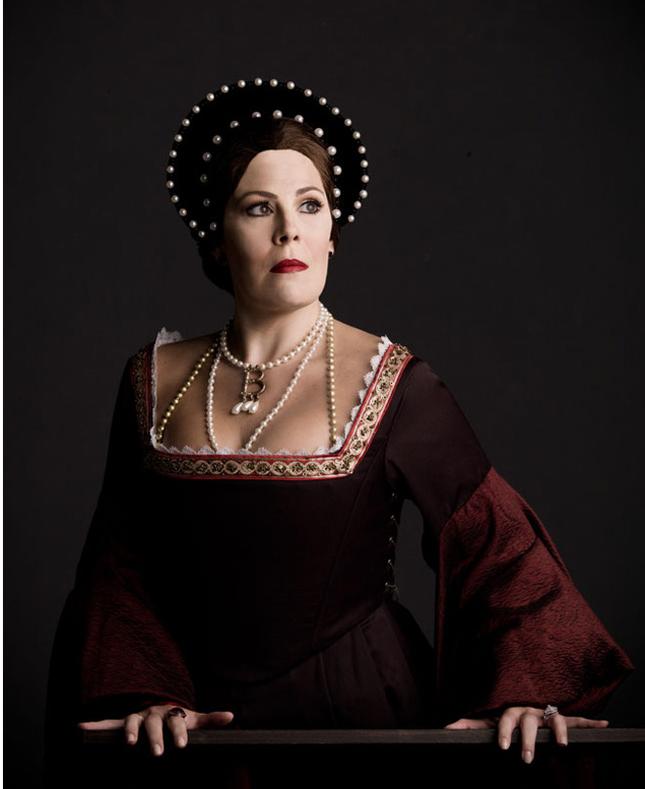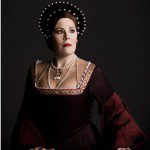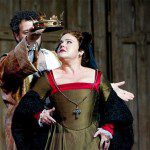‘Anna Bolena’: Experiencing Henry VIII’s World
By • September 21, 2012 0 2816

If Gaetano Donizetti’s 1830 work, “Anna Bolena,” makes him the virtuoso of bel canto opera, it also presages what comes next. In the dexterous, emotionally powerful soprano Sondra Radvanovsky, we might just have the perfect performer that connects the Verdi generation to bell canto.
At least, that’s what she demonstrated in her star turn in the title role of the Washington National Opera production of “Anna Bolena,” ably abetted by a strong cast, by the inventive direction of Stephen Lawless and by a story that is familiar to contemporary audiences through the outpouring of contemporary and older pop culture versions in books, literature, television mini-series and films.
In short, we know these people, we know Henry VIII, the impetuous and sexy object of his desire Anne Boleyn, her lost lover Percy, the woman who replaces her, Jane Seymour, even if they’re called Enrico VIII, Anna Bolena, Riccardo and Giovanna Seymouor, as is the Italian wont of Donizetti.
Now, we know them a little and a lot better, given the emotional and dramatic intensity of the production, the seething, soaring quality of Donizetti’s music and Radvanovsky’s voice and acting ability, which gives the lie to bel canto’s reputation as a venue and stage for pure technique and beautiful singing. We do hear beautiful singing, often of the kind that, as it should in this case, has the power to break hearts and make you hold your breath. Bel canto singing of the kind evidenced in “Anna Bolena” is a little like white water rafting, it’s treacherous, dangerous, full of runs that rush like waves on top of each other, where major and even mistakes can strip a performer naked.
On the evidence of “Anna Bolena” (and I don’t have any other for her), Radvanovsky is one fine white water rafter and heartbreaker as well. She’s said that Maria Callas—who brought bell canto opera back to popularity almost singlehandedly and you can just imagine how—is her inspiration, and she does her proud. The trick with opera is not just to lay back and pinprick the notes and technique. That won’t satisfy the less-than-aficianados. It’s the temperament of opera, the willingness to go all in—reality and plausibility be damned—that makes it so appealing, such an experience, and in “Anna Bolena” the experience is dramatically achieved by inspired singing. That’s what happens in the famous duet of dueling rivals between Anna and Jane Seymour, a duel of riveting, warring emotions that span jealousy, guilt, forgiveness, resentment, great passions, emotionally clarity achieved through singing. In this duel , Sonia Gonassy as Jane holds her own with Radvanovsky, it’s a kind of emotional and vocal duel which both of them win.
Director Stephen Lawless has chosen to stage this intensely focused story and production in a setting (by Benoit Dugardyn) that resembles Shakespeare’s Globe Theatre, a kind of surrounding area of rich brown wood that can reform itself to bring a scene into excruciating focus to become a bedroom, a chamber a prison cell, while above the doors is something resembling a circular balcony where crowds of courtiers, men and women in red and black, various factions, appear to peer down on the scene, creating a claustrophobic atmosphere for the characters, a place where no one is ever truly alone. This accurately reflects a political atmosphere that existed among Renaissance royalty and rulers in Tudor England, the beginnings of the police state.
In the staging, Lawless focuses the heart, no more than in an early scene, when Anne, sensing she may be in serious trouble of the fatal kind, imagines herself on the block, and goes through the graceful motions—arms outstretched, head on the block—of supplication and surrender. It makes your hair stand on end every bit as any of Radvanovsky’s vocal achievements.
Not only is Radvanosky’s voice a powerful dramatic tool—in the duel with Seymour, in her final scenes, in her glowing maternal powers when a child-princess Elizabeth is on stage but also in taking on the very fine bass Oren Gradus as Henry VIII. More traditional was the tenor Shelva Mukeria as Percy, a performer who has an appealing and grand voice but doesn’t quite achieve the charisma such a compelling swain should have.
This seems to me, at the very least, also a telling story about women and how deal with love and power and the desire for both. Throw into the mix the wonderful Claudia Huckle as Smeton—a so-called “pants” part in that she plays a young boy, a court singer smitten with Anna who ends up betraying her—and you have a grand powerful production of an opera that is bound up by one of opera’s first themes: power and its uses and misuses.
- Sondra Radvanovsky as Anna Bolena | Cade Martin
- Scott Suchman for WNO



